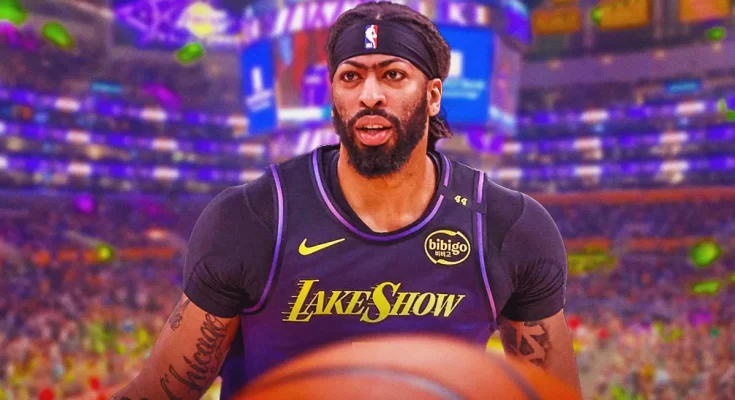Former Kentucky star Anthony Davis shared his disliking of the state of college basketball
Anthony Davis, a former Kentucky basketball star and now a prominent NBA player, recently expressed strong criticism of the current state of college basketball. His comments resonate deeply within the basketball community, touching on numerous aspects of the college game that many insiders and fans alike have debated for years. Davis’s perspective is particularly significant given his own journey through the sport—from a highly touted high school prospect to a collegiate superstar, and eventually to an NBA franchise cornerstone. His observations highlight key frustrations and systemic issues that plague college basketball, and understanding these concerns requires a comprehensive look at what he said, why he said it, and what it means for the future of the sport.
Anthony Davis’s critique of college basketball stems from his firsthand experience and a genuine passion for the game. As someone who has seen the sport from multiple angles, he understands the pressures and complexities faced by players, coaches, and institutions. One of the central points Davis raised is the disconnect between the supposed ideals of college athletics and the realities players encounter. At its core, college basketball is meant to be a developmental stage—a place where young athletes grow not just physically and athletically but also academically and personally. Yet, Davis argues that the system is failing many players by prioritizing profits, media deals, and the spectacle over genuine player development and well-being.
One major criticism Davis voiced relates to the recruitment process and the so-called “one-and-done” culture. Since the NBA implemented the rule requiring players to be one year removed from high school before entering the draft, college basketball has seen a surge of elite prospects spending only a single season in college before turning pro. This phenomenon has transformed the college game into a revolving door for talent, where the focus is less on building a cohesive team or developing players over several years, and more on showcasing individual stars for a brief period. Davis contends that this undermines the integrity of college basketball and reduces it to a mere stepping stone or showcase for professional scouts. It deprives players of a more holistic college experience and limits the ability of programs to cultivate a strong culture or tradition.
Beyond the player movement, Davis expressed concerns about the way college basketball handles player compensation. For years, players have been restricted from earning money from their name, image, and likeness (NIL), while schools and the NCAA rake in billions of dollars from broadcasting contracts, merchandise, and ticket sales. Davis’s view is that this model is fundamentally unfair and exploitative. Although recent changes have allowed athletes to profit from NIL deals, he suggests these reforms are just the beginning and don’t fully address the larger issue of equitable compensation. The fact remains that many players come from disadvantaged backgrounds and risk injury or career-ending events without guaranteed financial security. Davis argues that the system should offer more comprehensive support and protections to athletes who generate enormous value for their institutions.
Davis also criticized the NCAA’s governance and the way college basketball is structured institutionally. He described the NCAA as an organization that often prioritizes its own power and financial interests over the interests of players and the sport itself. The NCAA’s amateurism rules, complex eligibility requirements, and inconsistent enforcement of policies have created an environment where players and programs often feel caught in bureaucratic limbo. Davis believes that meaningful reform is needed—not just cosmetic changes—to make the system more transparent, fair, and focused on athlete welfare.
Moreover, Davis touched on the intense pressure and mental toll placed on college basketball players. While athletes are expected to perform at elite levels on the court, they also juggle academics, media obligations, and the ever-present scrutiny from fans and social media. This pressure cooker environment can have severe consequences for mental health. Davis underscored the importance of providing better mental health resources and support systems for college athletes, who are often young adults facing enormous expectations with limited guidance or protection.
Another facet of Davis’s critique involves the commercialization and entertainment aspects overshadowing the sport’s purity. College basketball has become a massive entertainment industry with huge TV deals, marketing campaigns, and branding efforts that sometimes prioritize spectacle over substance. Davis lamented how this emphasis on entertainment can detract from the game’s fundamental values of teamwork, sportsmanship, and education. The focus on individual stardom and highlight-reel moments, fueled by social media and constant coverage, can distort what college basketball should ideally represent.
Davis’s comments also touched on coaching and player development. He pointed out that not all college programs are adequately equipped or willing to nurture players beyond their athletic output. Some coaches and programs are primarily focused on winning at all costs, sometimes at the expense of players’ long-term growth or academic success. Davis advocated for a model where coaches serve not only as strategists but also as mentors, helping players grow into well-rounded individuals prepared for life beyond basketball.
In addition, Davis criticized the scheduling and travel demands placed on college players. Unlike professional leagues, college basketball players often face grueling schedules with little rest, frequent travel, and the challenge of balancing these demands alongside their studies. This workload can lead to burnout and physical strain, yet many programs do not prioritize player recovery or well-being to the extent professional teams do. Davis argued that reforming schedules and workload management is essential to preserving player health and maximizing performance.
Davis’s perspective carries weight because it reflects a growing awareness in the basketball community about the systemic issues facing college basketball. His criticisms echo concerns raised by other former players, coaches, and analysts who call for reforms that better align the sport with the needs of its athletes. The challenges Davis highlighted are not new but have become more visible as college basketball has grown in popularity and commercial importance.
His remarks also raise broader questions about the future direction of college basketball. As the landscape continues to shift—with NIL rights evolving, the NBA’s G League providing alternative paths, and debates about player eligibility ongoing—Davis’s insights urge stakeholders to reconsider fundamental aspects of the system. Should college basketball remain primarily an amateur, educational pursuit? Or should it evolve into a more professionalized environment that better supports athletes financially and developmentally? Davis’s critique suggests that without significant reform, the sport risks alienating players and fans alike.
Davis’s discontent with college basketball also underscores the tension between tradition and modernization. The NCAA and many college programs pride themselves on preserving amateurism and the educational mission of college sports, yet these ideals often clash with the commercial realities and athlete demands of today’s game. Balancing these competing interests is a complex task, and Davis’s observations challenge the sport’s leaders to find a path forward that respects both tradition and progress.
Anthony Davis’s candid critique of the state of college basketball shines a spotlight on numerous systemic problems—from the exploitation of players and the fleeting nature of the one-and-done culture, to the commercialization of the sport and the pressures on athlete mental health. His perspective is a call to action for reforms that prioritize player welfare, fair compensation, and a more sustainable and meaningful college basketball experience. As someone who has thrived at every level of basketball, Davis’s voice adds crucial insight into the ongoing debate about how to improve the sport for current and future generations. His words invite players, coaches, administrators, and fans to reconsider what college basketball truly stands for and how it can better serve the athletes at its heart.



